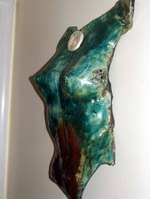 Slab-built torso, Fire in Her Belly, raku, by Tammy Vitale, Tam’s Originals
Slab-built torso, Fire in Her Belly, raku, by Tammy Vitale, Tam’s Originals
I subscribe to Feedblitz blogs and email newsletter – lots of them – to educate myself and also to share with you.
One of my favorites is Alyson Stanfield’s weekly email newsletter. She’s succint and knows her business. I wanted to post a link to one of her emails so I went to her blog but couldn’t find a way to do that. So I’ll just post from her emails here.
From her June 12 eletter:
"Your official portfolio is just that–fairly official. On the other hand, you may find need for something more comprehensive. Call it what you like: public relations notebook or just plain brag book. Either does the trick. You might include:
|
|
►Articles
. About you
. That you’ve written
. About your process
. About your medium
►Resume and/or Bio
►Artist Statement
►Postcards and Flyers
. From exhibitions
. From teaching
. From events
►Photographs
. Of your artwork (as long as you’re proud of them) . Of you in action Of your work in progress / process . Of your artwork in situ
►Testimonials
. From people who have purchased your work . From art consultants, gallery dealers, and festival promoters . From heads of arts agencies . From politicians (write a snail mail letter on an art issue in order to receive a reply) . From someone who wrote something nice on your blog
"Put your notebook out at art openings, festivals, exhibits, and classes . Take it with you to anywhere you think you might be asked about your work"
***
Great suggestions! I agree with every one of them. But as is always the case, she has a post on PR with which I take exception. I include that below with my comments in brackets italicized. I’m fascinated that she attributes these suggestions to a panel of "experts." I’d really like to know their expertise background! Here the eletter:
"June 26, 2006
I attended a nifty panel discussion last week in Denver about making your business more newsworthy. The topic was of interest not just to me, but for all of the work I do on behalf of my artist-clients. While keeping in mind that all of the five panel members dealt with business issues (they weren’t arts or features writers or editors), you still might benefit from what I learned.
|
Artwork included in original post. Shan’s link on the left here. |
►All of the panelists preferred to get a 2-3-sentence email pitch to a press release. You have to wow them immediately. One person said, "I know within two seconds whether it’s something I want to write about or not." This is especially true of larger papers. They want to own the story. They want to figure it out, so don’t write it out for them.
[While this may be true for large papers, it is NOT true for small locals where you are more likely to get PR anyways. Why compete at the national level, which is what large papers cover, when your story is more likely local? Identify and use your small locals. Most will run your whole PR piece as you write it. And tag along pictures you include as well]
►You are more likely to get coverage in smaller papers if you advertise in them. (This came from a later group discussion, not from the panelists.)
[ABSOLUTELY NO WAY!!! I have a 3 inch book of PR releases from my local papers. I NEVER advertise. It is a waste of money at this level. The locals are happy to have the news. You do NOT have to advertise]
►All preferred email, although the phone was sometimes okay. Don’t send faxes. And printed press kits and press releases are too big and bulky. (Online press kits weren’t addressed, but I’m a huge believer that they can’t hurt.)
[you will find email easiest for you too. I agree with this one.]
►It’s always best to have a contact at the media outlet, particularly in television. If you know someone, go to him or her first. Otherwise, do due diligence to understand who the appropriate contact would be.
[Again, for small local newspapers, you really don’t need a contact since that contact will be changing regularly . Locals are where journalists cut their teeth before moving on to bigger and better. Of course if you get them at the local level and can keep track of them, it may help you at the regional/national level later on. If you want TV coverage, get to know your local cable folks. And your local radio stations. In other words think: local, local, local.]
►While television needs just a few days notice, newspapers said "as far in advance as possible," while a monthly magazine needs your information at least 8-12 weeks ahead of time.
[yep, unless of course someone cancels or an interview doesn’t turn out as planned, in which case they may be dancing delightedly to see your late release. It happens. Synchronisity!]
►Don’t ever try to control a story. Once you contact the media, the story is theirs, not yours.
►Everything is on the record. If you don’t want your words to appear in print, don’t contact the media or respond to their questions. If you say, "This is off the record," the reporter quickly loses interest in talking to you.
[For the above 2 statements: NOT TRUE. While you may have to take a few mistated facts – small ones – the story is yours too. If they stray enough, write a letter to the editor correcting whatever you want to correct – it’ll get your info in the paper again. Same for a story well done – write a ltr to editor saying what a great report it was and cc the journalist. As for "off the record." Any journalist worth her salt understands that in the course of a conversation things get said. You are responsible for watching what you say – and you absolutely can say "off the record." Any journalist who does not respect that isn’t going to do a story you want to be associated with anyhow. They are looking for sensationalism.]
►Don’t ever send gifts to a reporter, but do thank them (duh!) whenever they give you a mention. They have ethics policies and are not allowed to accept gifts.
[Yes, but….meeting for coffee and paying for their coffee is allowed. These chats are how you get to know each other.]
►If you can’t translate your story into one that the media would be interested in, it might be valuable to hire a PR specialist.
[Yes, but…press releases are a formula. They are easy to do. Unless you don’t have time and really want to spend the money, do them yourself. After you practice you’ll be able to spin one off in 15 minutes. That said – I’m available to consult!]
Thought for the day: "Don’t let them tame you!" Isadora Duncan




1 Comment
Always nice to hear another voice. You might also be interested in Hap Hagood's response:
http://www.artbizblog.com/2006/07/submitting_arti.html